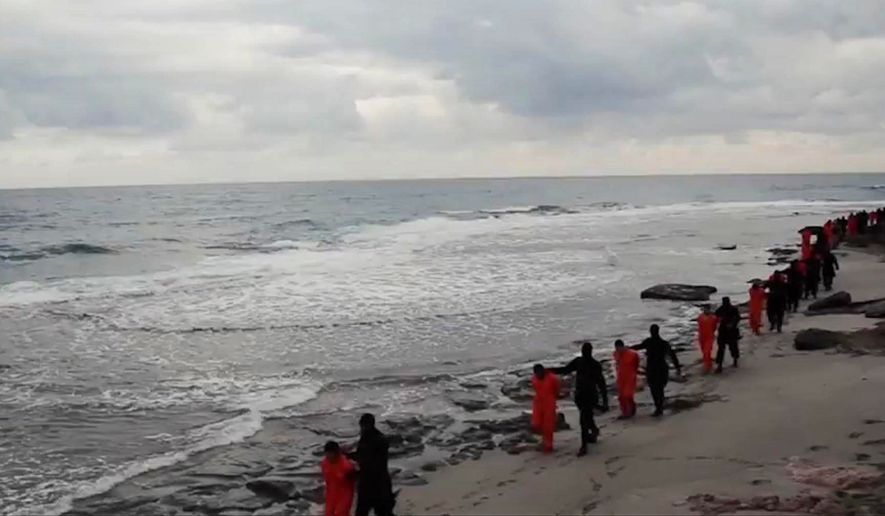The White House downplayed reports Thursday that President Obama is considering a “second front” against the Islamic State in Libya, saying only that the president is “mindful” of the extremist group’s growth in the chaotic North African nation.
“We’ve been mindful of this risk for more than a year and half now,” said White House press secretary Josh Earnest. “We’re going to continue to be prepared to take action.”
In December, Mr. Obama said Libya might have turned into “another Syria” if the U.S. hadn’t participated in coalition airstrikes in 2011 that helped to topple the regime of Muammar Qaddafi. But less than two months after giving that assessment, the situation in Libya has deteriorated, with the Islamic State estimated to have doubled its number of fighters there to more than 6,000.
Speaker Paul D. Ryan said Thursday he is concerned about Libya, after receiving classified intelligence briefings.
“ISIS is expanding its reach in many regions,” Mr. Ryan said, using one of the acronyms for the Islamist group. “This [Libya] is one of the most troubling ones. That is why we have to have a comprehensive strategy. This isn’t just a one-off thing. We have to have a comprehensive strategy to defeat ISIS.”
He said the national defense authorization bill passed by Congress last year requires the administration to devise a comprehensive plan to defeat the Islamic State, but said, “we have yet to see that from the president.”
SEE ALSO: Congress snubs Obama’s budget chief, works on own spending plan
Mr. Obama has been pressing Congress to approve a new authorization of military force against the Islamic State in Syria and Iraq, but lawmakers haven’t done so.
The president held a meeting with top military advisers last week on Libya, and The New York Times reported that Mr. Obama has asked the Pentagon to revise its options for military action while the administration steps up efforts to form a unity government. The range of military options is said to include airstrikes and special operations raids.
State Department spokesman John Kirby said the diplomatic corps is “very focused” on forming an inclusive government in Libya.
“Moving towards a political process and political solutions in Libya still remains a very important goal because we continue to believe that sustainable defeat of a group like [the Islamic State] is best done through good governance,” he said.
Asked whether Mr. Obama was nearing a decision to open a second front against the extremists in Libya, Mr. Earnest said, “I don’t think I’d describe it that way.”
“We’re going to continue to watch how the threat in Libya evolves,” he said.
SEE ALSO: Obamacare hits 12.7M customers for 2016, HHS reports
In 2012, Islamist militants attacked a U.S. diplomatic compound in Benghazi, Libya, killing U.S. Ambassador J. Christopher Stephens and three other Americans.
Referring to the estimates of Islamic State fighters doubling their force in Libya, Mr. Earnest said it’s “entirely plausible that this new count actually includes extremists that we already knew about, [and] they’re just affiliating themselves with ISIL.”
The White House also trumpeted a new U.S. intelligence estimate that the number of Islamic State fighters in Syria and Iraq has declined. Previously, U.S. intelligence agencies said the range of fighters numbered from 25,000 to 31,500; the new estimate is between 19,000 to 25,000.
Mr. Earnest said the lower estimate is likely due to the U.S.-led coalition’s efforts attacking the extremists from the air and working with local ground forces. He also said Turkey and the coalition are doing a better job of limiting the flow of foreign fighters traveling to Syria from the West.
The administration said its main goal is to attack the Islamic State in Syria and Iraq, where it has established a caliphate, believing it will weaken the group’s ability to spread to other countries.
“As we apply significant pressure on them there, we’ll make it harder for them to capitalize on political instability in other places,” Mr. Earnest said.
Mr. Obama said last year that without a broad international coalition to fight the extremists, the U.S. would be playing “whack-a-mole” in trying to defeat the Islamic State wherever it surfaces.
The president’s top counterterrorism adviser, Lisa Monaco, wrapped up a series of meetings in London Thursday with senior British security and intelligence officials devoted in part to defeating the Islamic State. The White House said they also discussed efforts to stop the flow of foreign fighters from the West to Syria and Iraq.
U.S. forces also are dealing with a growing Islamic State presence in Afghanistan. Army Gen. John Campbell, commander U.S. troops there, told the Senate Armed Services Committee Thursday that the Islamic State “directly competes with the Taliban for resources to establish a foothold in the country.”
Sen. Jack Reed, Rhode Island Democrat, asked Gen. Campbell if the Islamic State’s push into Afghanistan is requiring U.S. forces to wage “a much more vigorous counterterrorism activity than you contemplated a year ago, or the president contemplated a year ago?”
“Sir, that’d be accurate. Yes, sir,” Gen. Campbell said.
The U.S. has about 9,800 troops in Afghanistan, a force that Mr. Obama wants to reduce to 5,500 by January, after reversing an earlier plan to withdraw all forces this year.
• Dave Boyer can be reached at dboyer@washingtontimes.com.




Please read our comment policy before commenting.